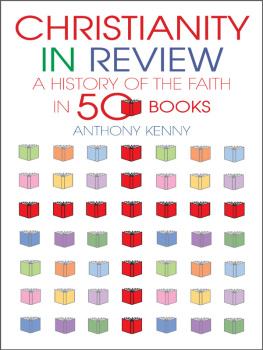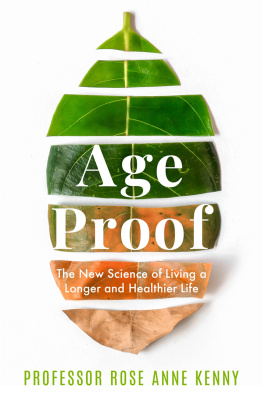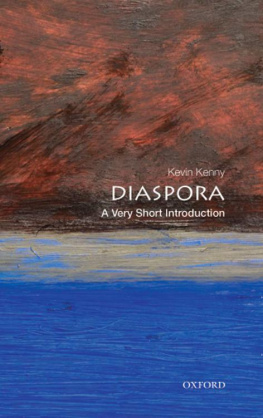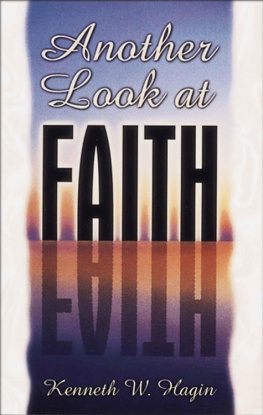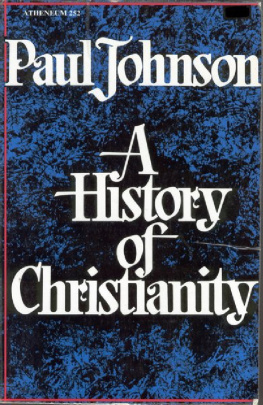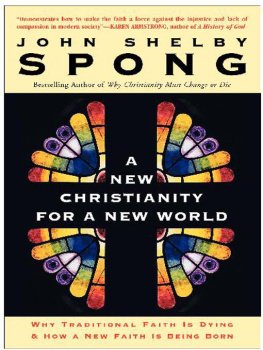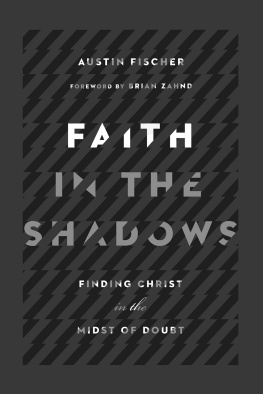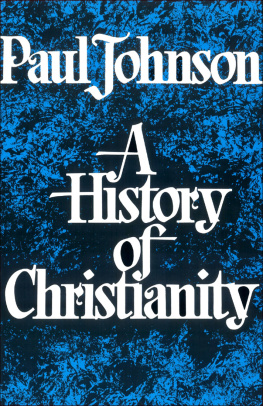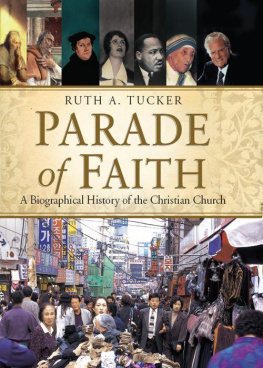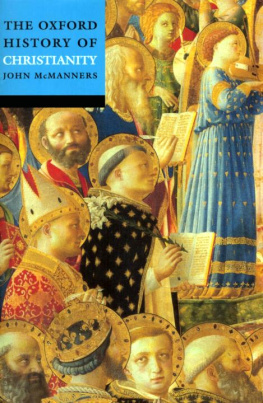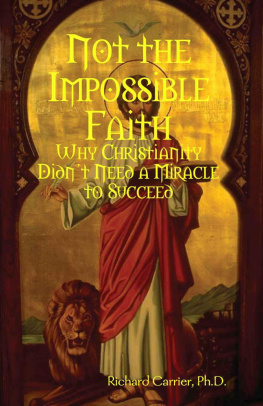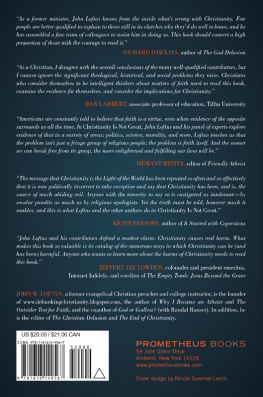Kenny - Christianity in review: a history of the faith in fifty books: A History of the Faith in 50 Books
Here you can read online Kenny - Christianity in review: a history of the faith in fifty books: A History of the Faith in 50 Books full text of the book (entire story) in english for free. Download pdf and epub, get meaning, cover and reviews about this ebook. City: London, year: 2015, publisher: Darton, Longman & Todd, genre: Religion. Description of the work, (preface) as well as reviews are available. Best literature library LitArk.com created for fans of good reading and offers a wide selection of genres:
Romance novel
Science fiction
Adventure
Detective
Science
History
Home and family
Prose
Art
Politics
Computer
Non-fiction
Religion
Business
Children
Humor
Choose a favorite category and find really read worthwhile books. Enjoy immersion in the world of imagination, feel the emotions of the characters or learn something new for yourself, make an fascinating discovery.
Christianity in review: a history of the faith in fifty books: A History of the Faith in 50 Books: summary, description and annotation
We offer to read an annotation, description, summary or preface (depends on what the author of the book "Christianity in review: a history of the faith in fifty books: A History of the Faith in 50 Books" wrote himself). If you haven't found the necessary information about the book — write in the comments, we will try to find it.
Kenny: author's other books
Who wrote Christianity in review: a history of the faith in fifty books: A History of the Faith in 50 Books? Find out the surname, the name of the author of the book and a list of all author's works by series.
Christianity in review: a history of the faith in fifty books: A History of the Faith in 50 Books — read online for free the complete book (whole text) full work
Below is the text of the book, divided by pages. System saving the place of the last page read, allows you to conveniently read the book "Christianity in review: a history of the faith in fifty books: A History of the Faith in 50 Books" online for free, without having to search again every time where you left off. Put a bookmark, and you can go to the page where you finished reading at any time.
Font size:
Interval:
Bookmark:
A History of the Faith in Fifty Books

First published in 2015 by
Darton, Longman and Todd Ltd
1 Spencer Court
140 142 Wandsworth High Street
London SW18 4JJ
2015 Anthony Kenny
The right of Anthony Kenny to be identified as the author of this work has been asserted in accordance with the Copyright, Designs and Patents Act 1998.
ISBN 978-0-232-53172-5
e-ISBN 978-0232-53220-3
A catalogue record for this book is available from the British Library
Phototypeset by Kerrypress Ltd, Luton
Printed and bound by Scandbook AB, Sweden
The reviews collected in this volume were written for various periodicals over a period of more than fifty years. Some of them date from a time when I was a Roman Catholic priest. Most were written during the course of an academic career, after I had been laicised and left the Church, while I was an Oxford don, first as Fellow, then as Master, of Balliol College. The most recent ones belong to the years since my retirement, as Warden of Rhodes House, in 1999. Looking back over them from the perspective of the present, I can claim that they add up to a coherent, if highly selective, history of Christian thought. They are presented here not in the order in which they were written but grouped according to the period or aspect of church history to which their subjects belong.
Anthony Kenny
September 2014
Christianity, like Judaism and Islam, is a religion of the book. Each of the three monotheistic religions possesses a text, or set of texts, that it regards as its foundation charter. The books of the Torah, the histories of Israel, and the writings of the prophets and psalmists provide the bedrock of Jewish religion. The same books are accepted by Christians as the word of God: an Old Testament, to find its culmination in the New Testament unfolded in the Gospels, and the Acts and Epistles of the apostles. Christianity and Islam both recognise the Hebrew Scriptures as inspired texts, bearing a message from God that has been superseded by a later, definitive, revelation in Islam that contained in the Quran. Members of all three faiths appeal to their own sacred texts to guide or justify their actions at the present day, and within each tradition there are many different methods and procedures by which the ancient sayings are linked to the conditions of modern life.
The authority of sacred texts, if they are to be taken as guides to practical life, is inseparable from the authority of the religious communities and officials whose role is to interpret them.
In the Judaeo-Christian tradition, for instance, the very notion of the Bible as a single entity depends on the various authorities throughout history who have established the canon. However impressive individual books of the Bible may be, to see them as being elements of a single revelation that contains also some or all of the other books is already tacitly to accept a religious authority which defines a canon. One might gather together the works of Homer, Hesiod, Aeschylus, Sophocles, Euripides, Herodotus and Thucydides into an epitome of Greek thought. The books would share a common cultural tradition and cohere with each other as well or ill as the books of the Old and New Testament do. But we do not treat them as a single book, to be treated differently from all other books, because there has never been a Hellenic rabbinate or episcopate to adjudicate on their canonicity and impose them as authoritative.
Christianity differs from the other religions of the book in an important respect. Christians do not believe that Jesus himself wrote any book, in the way that Jews have believed that Moses wrote some or all of the Torah, and Muslims believe that Muhammad committed to paper the words dictated by the Angel Gabriel. We know the teaching of Jesus only at second hand, from the accounts of his life given by the evangelists. Consequently it is important for Christians to form an opinion of the value of the Gospels as records of historical truth. In recent years even many conservative scholars have come to accept that the gospel narratives bear the marks of literary artifice as well as of historical record. For the most authentic account of primitive Christian thought many now prefer to focus on the letters of St Paul the earliest surviving documents rather than on the sayings attributed to Jesus in the Gospels.
When we consider the reliability of the New Testament record, we find that St Luke, the third evangelist and the author of the Acts of the Apostles, occupies a unique position. On the one hand many passages in the Acts that describe the journeys of St Paul are accepted even by atheist historians as likely to be eye-witness accounts. On the other hand the infancy narrative in the Gospel is treated as fiction even by some conservative Catholics. Scholarly debate on these topics is far from concluded.
For centuries Christians were divided on the relationship between the Church and the Bible. Should one accept the Churchs teaching only in so far as it accorded with the Bible (as Protestants claimed)? Or should one accept the Bible only because it was authenticated by the Church (as Catholics claimed)? Secular critics complained that all Christians were guilty of reasoning in a circle, giving authority to the Church on the basis of the Bible, and accepting the teaching of the Bible on the authority of the Church. Christians in response tried to show that there was no circularity, only symbiosis.
During the first three centuries after the death of Jesus Christianity was a minority sect, generally tolerated but occasionally persecuted by the Roman imperial authorities. The Emperor Constantine (274337) transformed it into an established church ruled by a hierarchy of bishops who often enjoyed temporal as well as spiritual power. A series of councils of bishops in the fourth and fifth centuries hammered out the formulation of the central Christian doctrines. Nicaea (325) proclaimed that Jesus was the son of God, coeternal with God the Father. Ephesus (431) declared that Jesus, a single person, had two distinct natures, one divine and one human. Chalcedon (451) affirmed that he was both perfect God and perfect man, with a human body and a human soul, sharing divinity with his father and sharing humanity with us.
The decisions of these councils henceforth provided the test of orthodoxy for the great majority of Christians. But the person who brought Christian doctrine into the shape which was to dominate the thinking of Western Europe for a millennium and more was St Augustine, who became a Christian convert in Milan in 387, and went on to become Bishop of Hippo in North Africa, where he died just too soon to attend the Council of Ephesus. Augustine presented an elaborate narrative of world history, from the original sin of our first parents Adam and Eve to the declining years of the Roman Empire. He devised an elaborate system to establish the role of divine predestination in the salvation and damnation of frail individual humans. His teaching on grace and freedom provided the background to controversies which rumbled on centuries after consensus had been reached on the doctrines of the incarnation and the Trinity. The greatest classics of Christian literature from Dantes Divine Comedy to Miltons Paradise Lost owe as much to St Augustine as they owe to the Bible.
Font size:
Interval:
Bookmark:
Similar books «Christianity in review: a history of the faith in fifty books: A History of the Faith in 50 Books»
Look at similar books to Christianity in review: a history of the faith in fifty books: A History of the Faith in 50 Books. We have selected literature similar in name and meaning in the hope of providing readers with more options to find new, interesting, not yet read works.
Discussion, reviews of the book Christianity in review: a history of the faith in fifty books: A History of the Faith in 50 Books and just readers' own opinions. Leave your comments, write what you think about the work, its meaning or the main characters. Specify what exactly you liked and what you didn't like, and why you think so.

